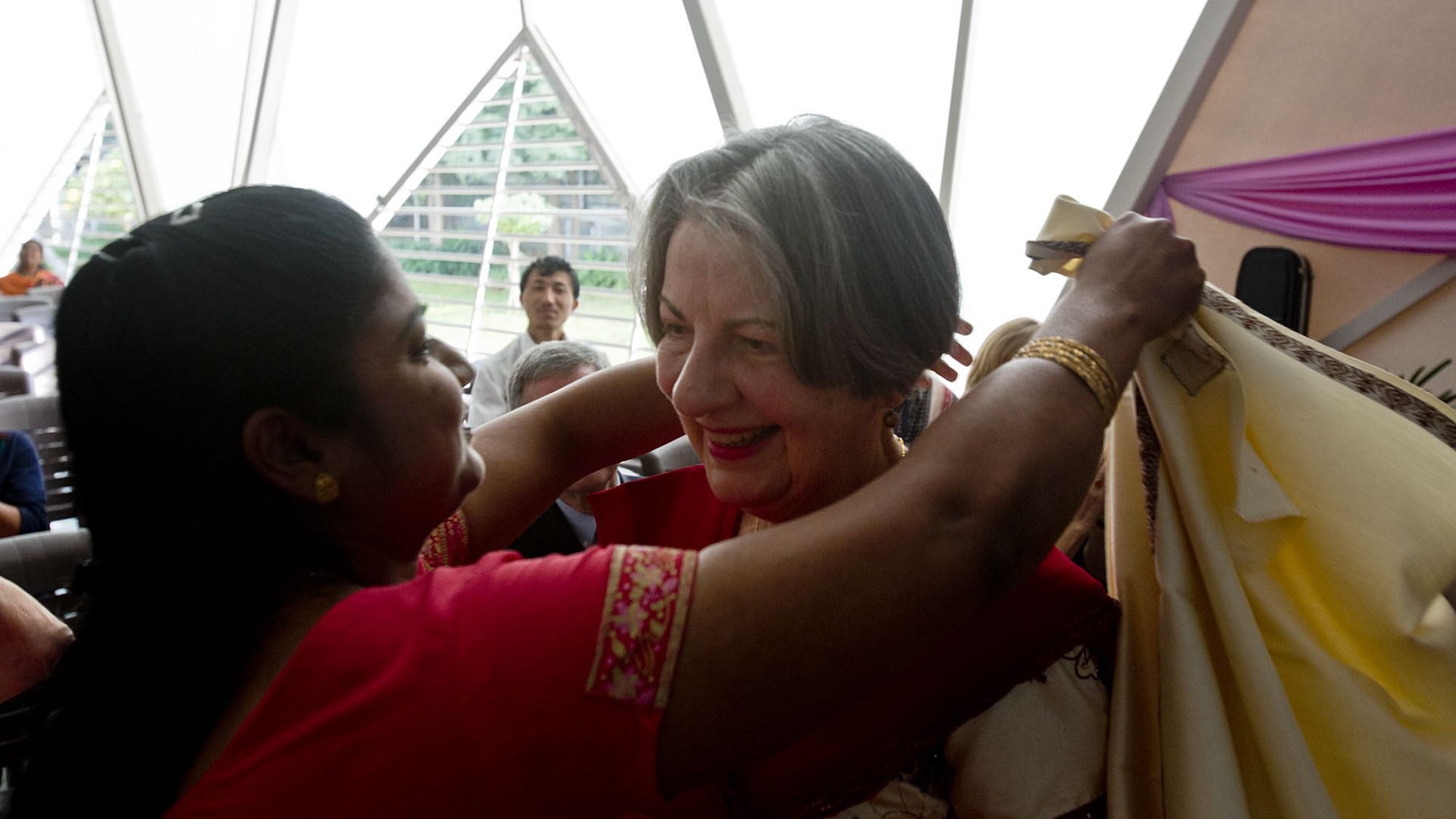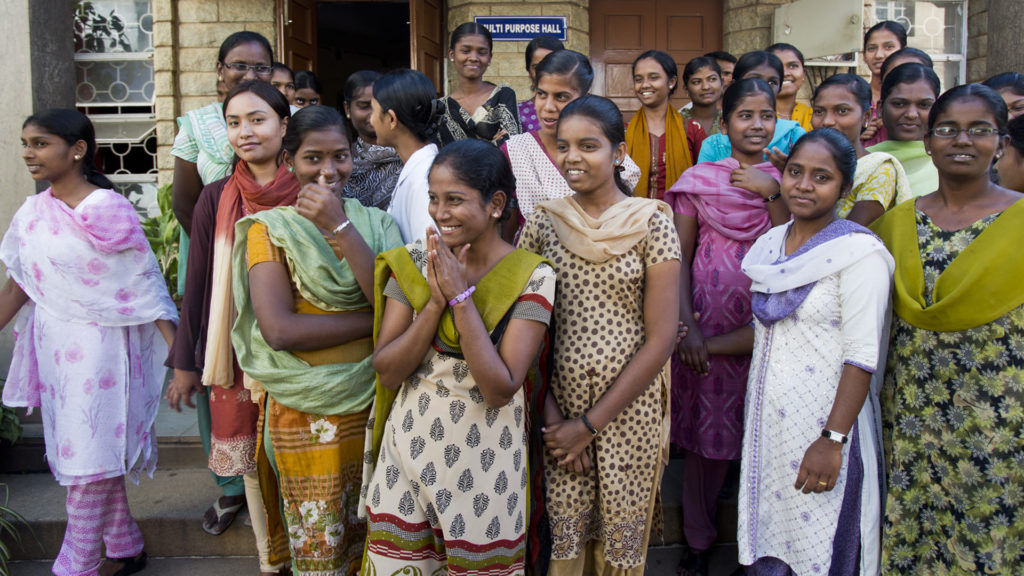
In October the American College of Surgeons (ACS) announced the recipients of the 2016 ACS/Pfizer Surgical Humanitarian Award. This year, for the first time ever, the award honored the extraordinary contributions of a former IMB missionary Dr. Rebekah Naylor.
Dr. Naylor served with IMB for thirty-five years as a surgeon, administrator, and teacher at the Bangalore Baptist Hospital in Karnataka, India. She established the adjoining nursing school now named in her honor: The Rebekah Ann Naylor School of Nursing.
I talked with Dr. Naylor about the balance between mission and medicine, perseverance through difficulty, the value of music and hospitality as opportunities for witness, and her advice for others called to serve overseas.
Eliza: Congratulations on your recent award. What does it mean to you to be recognized by your peers for making such a significant contribution in the field of medicine and humanitarian service?
Rebekah: I was overwhelmed and humbled that this recognition came to me. It was a privilege to serve God the way I did, and I saw this award as an opportunity for witness. I was required to make a presentation at the meeting of the American College of Surgeons in Washington, D.C., where I was able to give a testimony to the way the hospital in Bangalore gave physical life and spiritual life.
Eliza: Which came first for you, mission or medicine?
Rebekah: Medicine came first. In junior high school, I felt impressed that I should be a doctor, but I had no clue what that meant or how it would happen. A couple of years later, God spoke to me about medical mission. So the two were really one call. My call was to be a medical missionary.
Eliza: Did you ever feel conflicted between two paths? Was there ever difficulty balancing medicine and mission?
Rebekah: No, from the beginning they were totally integrated. For me, it was important to do both at the same time.
“When Jesus sent his disciples out, he told them to preach the kingdom of God and to heal the sick . . . Jesus modeled this balance.”
Bringing Faith to Work
Eliza: From your perspective, is it important for Christian medical professionals to bring their faith to work wherever they’re employed?
Rebekah: It’s not only important, but it’s essential for Christian medical professionals to bring faith to work. This should be true for every believer. Whatever we do, we should be clearly identified as followers of Jesus. Professionals spend so many hours in the workplace that there’s great opportunity to share with colleagues.
For doctors, there’s also a unique relationship with patients. Medical professionals can cross every barrier, whether geographic, economic, or social. We interact with people from every walk of life, and we have an opportunity to get to a spiritual conversation in minutes where for others it might take months. So Christian faith should be totally integrated into medical practice every day, wherever we are.
Eliza: How do you respond when people express concern that investments of time and resources in healing ministries and humanitarian relief might take away from evangelism and church planting?
Rebekah: My response is to take them to Scripture. It’s clear to me in the Bible that we shouldn’t separate the two. When Jesus sent his disciples out, he told them to preach the kingdom of God and to heal the sick and cast out demons. Jesus modeled this balance.
In Matthew 9:35 we find that Jesus went out to preach and to heal every disease. I also think of Matthew 25 where Jesus says that when you meet the needs of the hungry, the sick, the needy—“the least of these”—then you’ve done it to him. We also find this balance in the Old Testament, and it’s there in Paul’s writings. In my opinion, keeping the two together is necessary for every Christ-follower.
Meeting needs alone is not going to bring people to faith. Faith comes by hearing and hearing by the Word of God, but we are to meet needs while we speak the Word. We can’t separate demonstration and proclamation.

Hundreds of nurses have been trained at the Rebekah Ann Naylor School of Nursing at the Bangalore Baptist Hospital.
Perseverance in the Face of Opposition
Eliza: Let’s talk about the thirty-five years you served in India. You occasionally experienced real opposition to the work you were doing at the hospital. It must have been frustrating to fight for a visa when you were so busy helping the community. What made you stay despite difficulty?
Rebekah: My visa was always uncertain, but the biggest difficulty was that the government occasionally took away my license to practice medicine. It was humbling to sit in government offices and beg for a license, but I stayed because God called me and sent me to India.
I was confident that I was where I was supposed to be. I spent time in God’s Word and in prayer. Indian colleagues went with me and supported me during government visits. And I was so encouraged by all the faithful people in America praying for me. Prayer support was an essential part of my ability to stay.
“Loneliness is real, but it’s important to remember God is present and to pray for him to show his presence in a real way.”
Eliza: For a few years you were the only IMB worker in India. What encouragement would you offer for missionaries serving in places where there are no other workers and no local church?
Rebekah: Every person serving overseas will struggle with loneliness, even married people. The isolation is emotional and psychological. Fortunately, I was not without a group of local believers. I was blessed with Indian believing friends.
Loneliness is real, but it’s important to remember God is present and to pray for him to show his presence in a real way. Ultimately, God is more than adequate to meet your emotional needs. Even if there are no believers nearby, you can still find emotional support in the local community. I had Hindu and Muslim friends, and their support was significant.
Music and Hospitality Create Opportunities for Witness
Eliza: During your tenure at Bangalore hospital, you started a choir. How did your love for music develop, and what role has music played in your devotional practice and ministry?
Rebekah: I studied piano through college, but when I went to India I thought music was over for me. In the late 1980s, we organized a choir made up of about thirty hospital staff. For several years I accompanied and directed the choir. We gave concerts all over the city that were an opportunity for witness.
One year we performed the musical drama Emmanuel Has Come. I had never done anything like this with costumes, sets, acting, and music. We sold out the biggest auditorium in the city for five nights. The Christmas half of the program was aired on national TV. So music became a part of my ministry.
Eliza: When you were in India, how was hospitality an aspect of mission? Was your home also a place of ministry?
Rebekah: The home can be a wonderful place of ministry. It’s a safe place, a place where you can have conversations without interruptions. Hospitality was particularly important to me as a single person because it was a way of bringing my social life home.
One of the things I did the entire time I was in India was host a Christmas Eve tea. The first year I invited four Hindu ladies to tea. But over the years, the tea became an event of the social season. My last year in India, I invited 250 people—professional people, lawyers, doctors, pastors, and patients.
We made everything for the tea at home. Some guests were such strict vegetarians that I couldn’t put egg in any of the sweets. So I had a collection of eggless recipes. The only place all these people saw each other every year was at my Christmas tea.
The tea was an opportunity for witness. It was obvious that I had a Christian home. One year a Hindu doctor asked me to tell him about the nativity scene that was displayed. When people asked about the Christmas tree planted in a little pot, I talked about evergreens and everlasting life.
Integrating Medical Mission and Church Planting
Eliza: Since you returned from India in 2009, you’ve been busy working with Baptist Global Response (BGR) and you founded Mercy Clinic in Fort Worth, Texas. Do you think of yourself as a missionary based stateside?
Rebekah: Definitely. When I retired from IMB in 2009, I soon went to work for BGR as a global health care consultant. I mobilize health care professionals to go overseas both short-term and long-term through medical mission conferences and trainings. I go to Bangalore twice a year and help with spiritual ministry, administrative issues at the hospital, and teaching.
I’ll be teaching a new course at Southwestern Baptist Theological Seminary this spring about community development and human needs ministry. We’ll focus on the way mercy ministries can be strategically integrated into church planting. The course is for anyone interested in working cross-culturally, but it’s also applicable to pastors thinking about how to engage their own communities.
“You can’t be sloppy in your profession and hope to have a credible witness.”
Eliza: You’ve been an active part of the mission community for nearly fifty years. Are there trends in approach to mission that concern or encourage you?
Rebekah: One trend I’ve noticed is how many more short-term volunteers are coming overseas. The mission tourism business concerns me, but sometimes volunteers are very helpful and strategically important.
There are also global trends that affect mission. For instance, now we have the ability to communicate with people even in the most restrictive places in a way we couldn’t have imagined fifty years ago. There are more ways to share the gospel now than ever before. We’re seeing God do some remarkable things, even in India, and that is extremely encouraging and exciting.
Eliza: What advice would you give to those in the medical profession who feel God may be calling them to use their experience and skills in cross-cultural ministry?
Rebekah: You need to be sharing your faith right now. When you go overseas you don’t just automatically start telling people about Jesus. Evangelism has to be lived out in your present context. Strengthen and develop your spiritual disciplines: prayer life, fellowship, and Bible study. Learn more about the spiritual and physical needs in the world.
You should also be excellent in your profession. You can’t be sloppy in your profession and hope to have a credible witness. Continue to update your skills.
Make yourself available to God whether you are here or overseas. As you submit to be available to God, God will use you.
Get Involved
Opportunities are available for healthcare professionals to serve overseas short-term or long-term. Browse opportunities to learn more.

